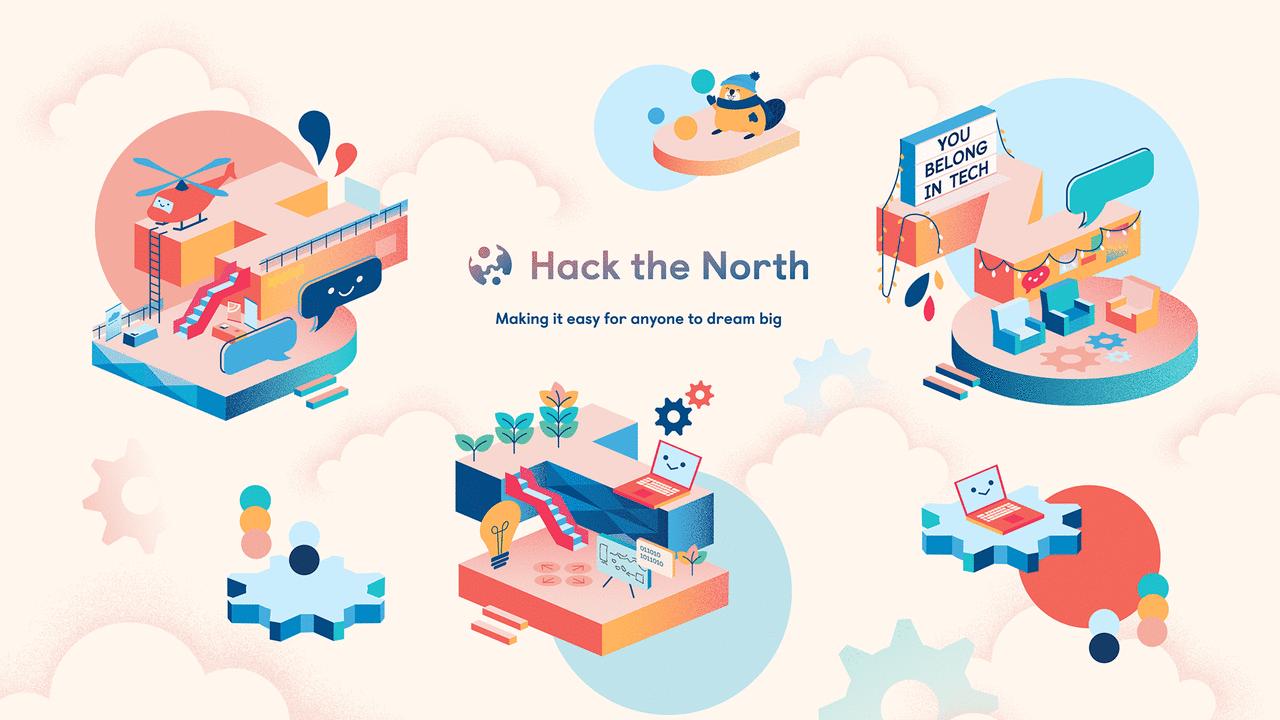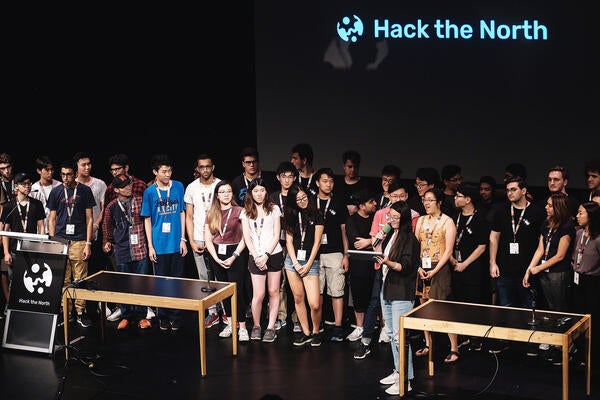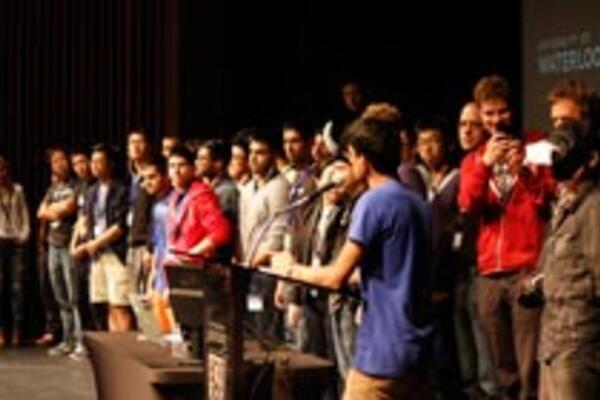
Building something incredible (in 36 hours)
Hack the North 2020++ brought together thousands of hackers from around the globe

Hack the North 2020++ brought together thousands of hackers from around the globe
By University RelationsAn automated speech coach to help you nail your next interview. Image recognition that can always find Waldo. And a voice-controlled scanner that allows you to 3D print a medical cast.
Those are just a few of the projects created by over 3,000 student hackers who attended Hack the North 2020++ from January 15 to 17, 2021.
Now in its seventh year, Hack the North is Canada’s biggest hackathon. Teams of up to four are given just 36 hours to experiment and create unique software or hardware projects from scratch.
Supported by the University of Waterloo and a long list of industry sponsors, admission to Hack the North is free. The event is put together by a volunteer team of more than 40 students and recent alumni and is open to attendees of any background and skill level. There’s no experience required: in fact, around one-third of the participants this year were first-time hackers and more than 550 were high school students.

> Emily Wang
> Co-director of Hack the North
“A lot of times we have newer hackers and they come to our event without much exposure or knowledge about the tech industry, or just about tech in general,” said Emily Wang, co-director of Hack the North. “And it's always really nice to hear the stories of how it impacts them. I think it's giving people their initial exposure and being part of the reason that they find their interests in the area.”
In the past, hackers travelled to the University of Waterloo campus from around the world for the weekend event, with flights, accommodations, and other costs covered by Hack the North. But with COVID-19 restricting travel and gatherings, the organizers were forced to re-imagine the event and move it online.
They made the most of it, taking advantage of the opportunity to expand without the limitation of building capacities or hospitality budgets. Hack the North doubled the number of hackers they accepted from 1,500 in 2019 to more than 3,000 this year.
They also launched a new program called Gear Up, a series of workshops that were open to the public in the days leading up to the hackathon including tech talks, career advice and more.
“I think silver lining is a pretty good way to put it,” said Wang, who is also a Systems Design Engineering student at Waterloo. “As an organization, we've always wanted to do more in terms of help for the community and the public. And the impact of reaching double the number of hackers, even if the experience isn't the exact same, is very valuable.”
The Hack the North team made every effort to bring hackers the same sense of community that the in-person event provides. Discord channels were set up to connect on everything from gaming to food, speed networking linked pairs of participants and special events including games and a karaoke contest were brought online to add to the experience.

> Anna Liang (BSc'20)
> Hack the North logistics team lead
“We put a lot of effort into making sure that hackers feel like they're a part of a community and that they're all contributing to something great,” explained Anna Liang (BSc ’20), one of Hack the North’s two logistics team leads. “That included taking advantage of the online format to add workshops and meet-ups with industry leaders from around the world.”
“If it was in person some of the logistics might not work out, if people had to travel. But we were able to get awesome speakers and leaders to be our judges and guests at our event because it's more accessible for them now.”
Two of those experts doled out advice at the event’s opening ceremony on Friday. Keynote speakers Chamath Palihapitiya (BASc ’99), the founder and CEO of Social Capital, and Vinod Khosla, founder of Khosla Ventures, sat down to talk about taking risks and innovating to solve problems and to answer questions from the hackers.
Palihapitiya was recognized this week in the 2021 Maclean’s Power List, a ranking of 50 influential Canadians. A frequent guest and ardent supporter of Waterloo, he brought the trademark passion that landed him on list to the hacker and emphasized the importance of finding mentors.
“Find people that you look up to and admire them and just be motivated by them,” he advised. “And the imperfect path is much more motivating. To go through the ups and downs and come from not too high expectations and have some stumbles and struggles and failures — I think that that richness is what heroes are about.”
Khosla, who Palihapitiya identified as one of his mentors, also left the creators with words of inspiration as they set out to build their projects.
“I like to say the future is not knowable. But it's discoverable, and it's inventible. You try lots of things, you fail in small ways, and then hopefully get successful in a large way. I fundamentally believe most people can do much more than they think they can, and they are limited not by what they can do but what they think they can do.”

Read more
Talented participants from around the world converge for big invention event at Waterloo

Read more
1,000 students from around the world are at the University of Waterloo this weekend to build mobile apps, web platforms, robots and more

Read more
More than 1,000 students from around the world will gather at the University of Waterloo this week for Hack the North, Canada’s biggest hackathon
The University of Waterloo acknowledges that much of our work takes place on the traditional territory of the Neutral, Anishinaabeg, and Haudenosaunee peoples. Our main campus is situated on the Haldimand Tract, the land granted to the Six Nations that includes six miles on each side of the Grand River. Our active work toward reconciliation takes place across our campuses through research, learning, teaching, and community building, and is co-ordinated within the Office of Indigenous Relations.